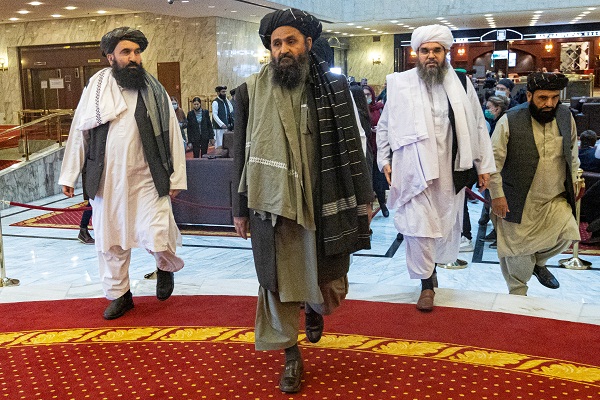
WORLD seems more concerned about the future of Afghanistan especially after the formal completion of withdrawal by the US and NATO. Surprising quick melt-down of Afghan Army, fleeing of Ghani regime’ officials and unexpectedly smooth entry of Taliban in Kabul have caused quite a large embarrassment for the US.
While defending the decision of withdrawal, President Biden and his close aides openly admitted that no clear purpose was available to continue the military campaign any further in Afghanistan.
During Congressional hearing on handling of withdrawal, US Secretary of State Antony Blinken had to face harsh questions from Republicans who blasted the hasty pull-out.
Democrats blamed the Trump for laying the foundations of withdrawal by fixing the draw down schedule in Doha deal last year. Blinken said “Biden team inherited a deadline; not a plan”.
As the saying goes, success has many fathers but failure is always orphan. Apparently, Republicans and Democrats are not ready to own the bitter failure in Afghanistan orchestrated over two decades by none other than the US and its NATO allies.
Leaving aside the post-withdrawal optics, which project the departure as a sign of US retreat from the Afghan arena, it is more important to evaluate the possible unfolding of events in the context of pertinent regional developments.
Undoubtedly, Afghanistan was constantly ruined by the incompetent and corrupt regimes installed by the US for the past two decades.
Instable and ill-governed Afghanistan will continue to harm the neighbours. Pakistan, being a major sufferer of destabilized Afghanistan, urged the Taliban to address the genuine security concerns at priority.
Similar concerns of varying nature prevail among other neighbours of Afghanistan including Russia, China, Iran and Central Asian Republics.
Fact of the matter is that Afghanistan, during the past two decades under, the US and NATO, continued to be a hub of militancy, corruption and proxies.
Instead of bringing socio-economic stability, dubious campaign led by US transformed Afghanistan in a base of terror threatening the major part of the region.
TTP along with its multiple splinter groups operated with full impunity against Pakistan and launched heinous terrorist attacks from Afghan soil.
Artificially imposed puppet regimes in Kabul kept testing the patience of Pakistan through persistent ignorant stance towards India-sponsored proxies.
It was very hard for Pakistan to facilitate a complex dialogue process between the Taliban, US and highly inconsistent suspicious Kabul government. Time has proved that Pakistan’s reservations about Ghani regime were absolutely correct.
While poor Afghans confronted economic and governance crises, the funds meant for their well-being were stacked in personal secret vaults by the ruling elite like Ghani and Amar Saleh.
Eye opening facts revealed about transportation of cash-filled bags by fleeing Ashraf Ghani and recovery of huge amount of cash coupled with gold bricks from the residence of Amar Saleh.
Obviously, corrupt ruling elite, on one hand, spoiled Afghanistan and on the other hand, exposed the whole region to the foreign sponsored terrorist groups.
A destabilized Afghanistan left in disarray by the US now seems more peaceful and calm under the informal control of Taliban.
Major regional players like China, Russia, Pakistan and Iran are persistently offering assistance to stabilize Afghanistan through formation of an all-inclusive interim government.
India is the only singled out country in the region which carries a spoiling agenda much different from the rest of the neighbours of Afghanistan.
Being a diehard supporter of past corrupt ruling elite, New Delhi is now facing a diplomatic dilemma in order to engage with the Taliban.
This frustration is evident from highly toxic anti-Taliban campaign on Indian media outlets usually known as propaganda mouth-piece of BJP and RAW.
Pakistan’s positive contributions in all phases of dialogue process and international evacuation operations are being widely acknowledged by all relevant quarters.
False myth of Pakistan’s international isolation created by Indian influenced quarters has busted with recent developments.
The world is listening and understanding the principle-based stance of Pakistan which only aims at restoration of durable peace in Afghanistan through non-violent political engagement.
Islamabad has very rightly urged the US to release the frozen funds of Afghanistan as financial strangulation would hinder the process of stability and reconstruction.
Pakistan has practically proved its claim of being a partner in peace by extending support to Afghanistan and international community in the most critical moments amid chaotic post-withdrawal scenario.
Taliban’s diplomatic strategy so far appears balanced and wise. Their response to hyper speculations of Western world on human rights is quite mature and well-articulated.
While being in no hurry to inaugurate a formal interim government, Taliban are gradually consolidating their grip by filling the key posts.
International players, while being hesitant on the question of formal recognition, have also softened their stance by extending financial support for Afghanistan and urged the Taliban to fulfil their commitments.
Whatever transpires from recent evolving situation of Afghanistan, will surely dictate future course to the regional players.
As far as Pakistan is concerned, future interim government has to adopt a clear policy to curtail the operations of TTP and its splinter groups.
Recently held conference of regional intelligence chiefs in Islamabad has also sent a clear message to Kabul that any further use of Afghan soil by terrorist groups against the neighbours would be harmful for the entire region.
Obviously, regional stakeholders are striving hard to carve the stability out of deep-rooted crises in Afghanistan.
—The writer, a retired Col, is contributing columnist, based in Islamabad.
Published in Pakobsever


